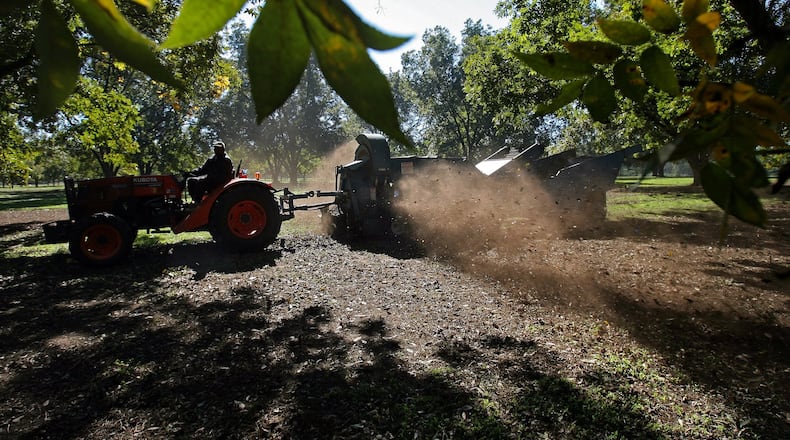For years, members of Georgia’s congressional delegation and U.S. trade officials have urged their counterparts in India to lift that country’s hefty tariff on pecans. A 100% customs duty on imported pecans made them too pricey for consumers and limited U.S. growers’ ability to do business in the nation with the world’s second-largest population.
The multiyear lobbying effort has finally paid off.
On Wednesday, India announced that it would reduce the tariff from 100% to 30%. Because Georgia is the leading state for pecan production — representing one-third of all U.S. production — state growers could see a boon if the Indian market opens up.
Altogether, U.S. pecan sales in India could increase from $1 million per year to $50 million to $60 million by 2030, according to Pecan South magazine.
U.S. Sen. Jon Ossoff traveled to India last year to meet with economic and political leaders on the issue, and he hosted a roundtable in Georgia last month with pecan farmers and U.S. Trade Representative Katherine Tai. The Atlanta Democrat also met seven times with India’s ambassador to the U.S., Taranjit Singh Sandhu.
Ossoff celebrated the announcement that the tariff was being slashed and said the nation’s pecan growers deserve credit for never letting up on the issue.
“They’ve been working on this for years,” Ossoff said. “They deserve a huge amount of credit for pushing this, and it will help open up this huge market to Georgia pecan growers. But there’s still more work to do.”
U.S. Sen. Raphael Warnock, who chairs the Senate Agriculture Subcommittee on Commodities, Risk Management and Trade, sent a letter to Tai in August urging her to create more trade opportunities for pecan growers and shellers. Ossoff and several other senators from both political parties also signed the letter, which mentioned the tariff.
“Demand for tree nuts continues to grow in India, and high tariffs mean that the pecan industry is not able to participate in this booming market,” the letter said. “India’s principal goal of the pecan tariff is revenue, but the high tariff has resulted in few imports and consequently little revenue for the country,”
U.S. Rep. Sanford Bishop, who lives in Albany and is the top Democrat on the Appropriations Subcommittee on Agriculture, has also been engaged on the issue. So has U.S. Rep. Austin Scott, a Republican from Tifton. Bishop and Scott both represent rural South Georgia districts where the pecan industry is prevalent.
At different times, they each sent letters to Tai pressing her on the tariff issue. Other members of the Georgia delegation also signed on, and the letters had bipartisan support.
Tai wrote back to Bishop in December 2021 to say she heard his concerns and that lowering the tariffs was a priority for her office as it engaged with leaders in India.
About the Author
Keep Reading
The Latest
Featured




